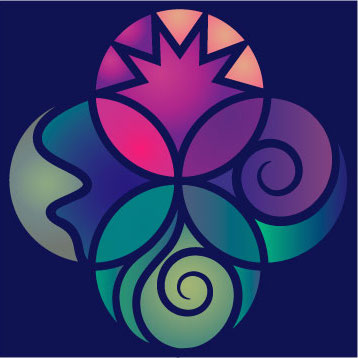Catching Spirits
/
The first dead body I saw was that of someone I loved immensely. She’d lived a grand, full life and was ready to go. She taught me a lot about life and gardening.
I think about her often when I am working in my little garden in the desert, with the plants growing up on the bare, packed red sand. The first generation of seeds sown here were hardy and nourishing to the soil. There’s comfrey, with stems as thick as your wrist. The plants are crowned by brilliant blue flowers that attract native bees, and other pollinators, including the local orange wasps, which in turn, help my little tomato plants and the delicate pomegranate tree to bear fruit. There’s also sow thistle, which provides shelter to delicate new plants coming up. The tender leaves of the young sow thistle are as good as silver-beet, fried with pepper and butter. Then there’s coriander seed, which is delicious crushed up with buttered carrots, something else that dear old lady taught me.
I’m grateful for the learning experience of visiting her body after she’d passed. Her small body was most remarkable for the clear understanding it gave me that she was no longer there. Death was a profound mystery to me then. “The tradition of all dead generations weighs like a nightmare on the brains of the living,” said Karl Marx in 1852. More than a century later, as a young woman in the pattern-smashing, system-expanding 1970’s, his words—on death and other matters—resonated with me. I appreciated his understanding of the frustration that young people feel, born into systems and patterns that they feel no responsibility for.
But now, I see dead people and dead things all the time and it’s all okay.
My experiences with dead and dying patients and their friends and families form an important part of that growth. When I worked in palliative care, I often had the experience of being “visited” by the spirits of my dying patients. They came to say “Thanks, I’m off now. You’ve been great, everything’s fine. It’s all about love.” Such dreams are commonplace working in that field. One loses one’s fear of ghosts and, I daresay, much of the fear of death with it.
I also grew in respect for those who went before as I came into my thirties. We stand on their shoulders. I would not have become a doctor without the hard work of several generations before me.
In the traditional healing of the local Aboriginal people, the Anangu, there is an understanding that a person’s spirit can be disconnected from the body, causing sickness. You can even see the healer — the ngangkari — looking for a person’s spirit, finding it under a bush and restoring it to the sick person on this video.
Another ngangkari skill is being able to bring the spirit of a dead loved one into the body of a parent, child or partner who is grieving too much. If the spirit of the one who has passed wants to stay close, but the one left behind cannot feel them, the ngangkari can bring that spirit into the body of the living one to provide constant nearness and comfort.
I have also been told (from an English tradition) that poltergeist behaviour — paintings tilted, lights flashing, books dropping — is a product of the departed one wanting to annoy those staying behind. Being reminded that the one who passed could sometimes be irritating (like the rest of us), is said to be an antidote to pathological pining.
Now in my fifties, I still feel empathetic towards the young ones who cannot bear to look death and decay in the face. They can’t figure out which direction to take, they don’t understand why they shouldn’t be rock stars, they are still surprised that physical work injures their backs, shoulders and arms. They are shocked and disillusioned that a working person’s life can be so hard. I see these people at my work every day. I must drive their employers mad by believing in their crises and collapses, while their employers would like them to be hardy and resilient like those tough weeds that never seem to die.
But the weeds do die and in my garden, my first generation of weeds are giving way to the next. The first coriander plants are dead and brown now, their flavourful seeds scattering into the yard for next year. The minerals gathered in the leaves of the comfrey plant will nourish the soil when they fall down, making it richer and readier.
The days are long but the years go fast. I consider it a blessing as a doctor that I am called to unexpected births and deaths. People who come to visit our beautiful part of the world sometimes seem to feel that they have finished the work of their life and can let go of it while they are here. At least that is how it seems when I see the body, empty and brittle as a cicada shell, the spirit departed in their sleep, the face relaxed and sometimes even smiling. If a person has lived a full and rich life, learned a lot, played and loved, then I can feel sad for those who will miss their physical presence, but I don’t necessarily feel sad for them.
They can always come back and visit after all. Whether making their presence known by an annoying cupboard door slamming in the kitchen or saying hello as a spectacular orange wasp bringing pollen to my garden, they are not too far away.
Thumbnail photo of starry sky through the slot canyon by Mark Basarab.




